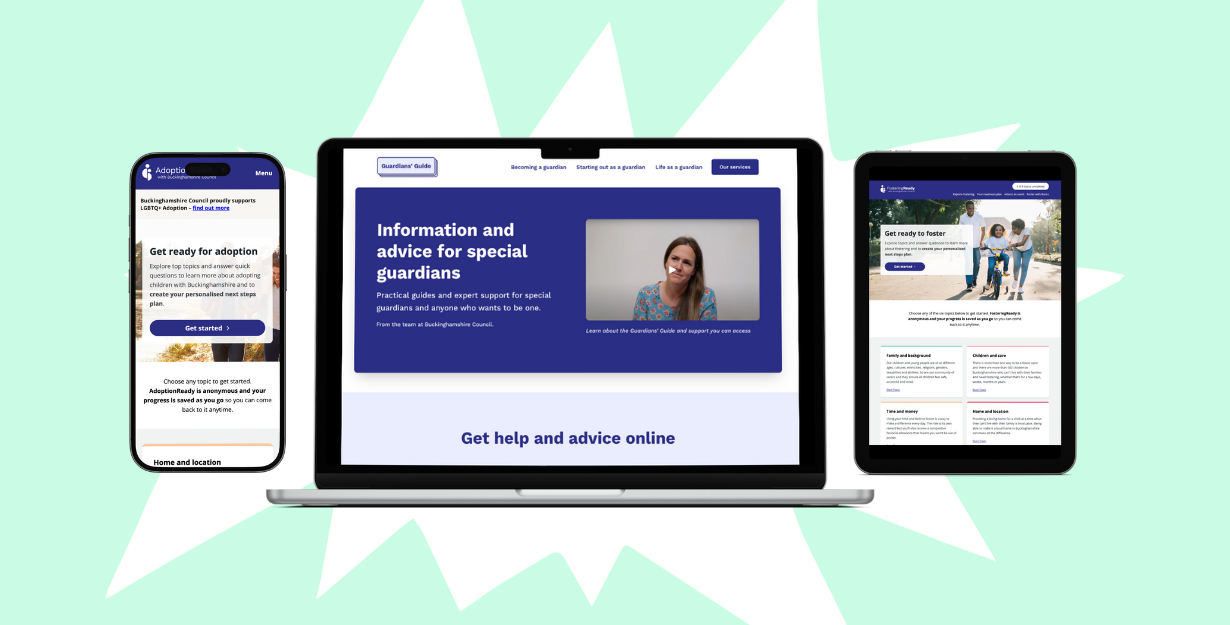Following the Childcare Act 2006 when the statutory duty arose to share this information online, the rush to create online directories saw products introduced that overlooked the need to understand the type of information residents are looking for. This has resulted in the creation of tools at an extra cost to local authorities that stifle innovation, increase vendor lock-in and limit the value of content and data.
Buckinghamshire recognised an opportunity to tailor an effective, sustainable, open-source product for the Buckinghamshire Family Information Service.
A custom built tool for residents and staff
We’ve been able to build on our experience as West Sussex County Council’s Local Offer partner and previous service directory projects with Hackney and Buckinghamshire Adults Services.
We’re proud to have officially become an Ofsted approved supplier, which has helped as we create a custom-built admin tool for staff and providers to manage their service data, an open API and a public-facing application for residents to find local childcare, support services and activity providers and Special Educational Needs and Disability (SEND) services.
We started this project in February with COVID-19 changing things about 10 weeks into the work. Moving to remote working forced us to rethink our approach with service staff, as we wanted to encourage the sharing and communication of progress, allocating tasks and gathering feedback effectively.
We’re developing this new system in a way that separates the user-facing tool from the admin interface to open up the potential for re-use across different service areas within the council.
The public-facing tool will support residents to find high quality, trusted advice, services and events that match their unique needs. We’ve built on insights from Buckinghamshire’s local offer co-design sessions to conduct remote 1–1 testing sessions with families and young people. These sessions have helped us to understand the different journeys people go through, the advice they’re looking for and the information they need.
Working closely with the council, we’re also identifying how to rationalise categories and apply filters to offer simple navigation that allows residents to easily search for events and advice, reducing the time spent searching for the information they need. We’ve actively and consciously made a move to more product demonstrations, deliberate task setting, clear agendas and check-ins to continue to build trust and allow space for reflection in this remote environment.
The second part of the system is the admin interface, where staff and providers can easily and securely manage service information. Staff can effectively govern and moderate the content to continuously ensure that quality and relevance are maintained. The Early Years Business Intelligence team will also be able to monitor childcare record updates coming through from Ofsted.
We’re striving to make this experience simple and automated, using alerts and version history to provide greater transparency and reduce manual tasks for staff, freeing up their time to support providers and families. We’ve also integrated an open-source analytics tool to support data-driven decision making, which will ensure statutory reporting compliance. This tool will also allow staff to report on the service provision in their local areas.
Applying the OpenReferral data standard
We’re attempting to use the OpenReferral UK data standard to create a new database schema to migrate over the current database. Alongside this, we’re building a standard-compliant open API so the data can be accessed. Using this standard will help to open up many possibilities for innovation in the sector.
Making sense of the current data is challenging due to its size and messy and inconsistent format in the backend. We’ve been working on time-consuming and complex tasks to determine which fields should be migrated and where and how this affects the application code. However, aligning to this standard will allow Buckinghamshire’s service data to be programmatically read alongside similar service directory endpoints that are also in the same standardised format, which makes the data easier to maintain and allows it to be shared across multiple interfaces and products.
We’re passionate about building flexible products using modern technology and tooling to meet user needs. We put emphasis on using open interoperable standards and technologies that allow products to evolve, adapt and respond to changes in use and technology trends.
The new Family Information Service is planning to go live later this year when the team have completed their content review and created new information and advice pages that link to the Service Directory. We’re delighted to be part of this innovative project that is challenging the sector to think about product development and data in a much more scalable, flexible and transparent way.

Digital tools empowering residents to care for at-risk children
Creating a groundbreaking suite of new digital tools to support caregivers of at-risk children, provide guidance and drive applications.
Read moreOur recent insights

Designing and developing FamilyStory
Focusing first on child protection, FamilyStory is transforming the way local authorities approach technology for children’s social care.
Read more
8 lenses for service transformation
By thinking about the specific parts of a system or service, and how they relate to one another, we can begin to understand the interactions between them and identify opportunities for change.
Read more
A connected approach to housing allocations and homelessness
For the last decade, the number of people in crisis or seeking help with homelessness has increased. With homelessness high on the political agenda, we have a once in a generation opportunity to design homelessness services for the 21st century.
Read more

